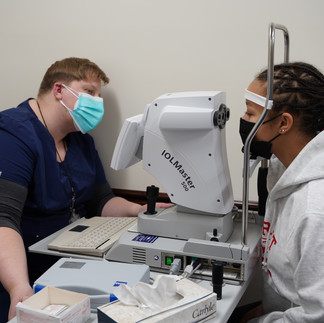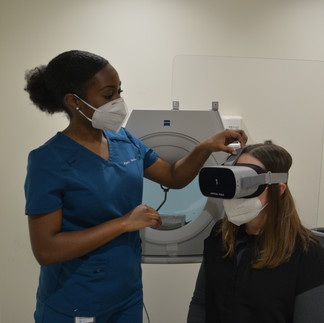Faculty Spotlight: An Interview with Dr. Pang
- Illinois College of Optometry
- Mar 3, 2022
- 5 min read

What made you interested in heading research at ICO?
Well, I chose quite a few paths before ending up at ICO. In China, I completed my MD specializing in ophthalmology. In America, I completed my PhD at UAB in Vision Science and Physiological Optics and my OD at NECO. Ultimately, this exposure helped me continue my quest for knowledge. For me it was always clear that I would combine clinical care with important research initiatives. I knew that whatever I did, it would have to involve research and more specifically clinical research.
I have always wanted to find answers to the many questions I have. As I was going through optometry school, I found that often there was no clear answer as to why treatment A was superior to treatment B. I needed research to get those questions answered. I wanted to know what was best for the patients we treat.
Dr. Pang seeing one of her myopia control research subjects. In this clinical trial they are trying to determine the effectiveness of low dose Atropos on myopia progression.
What’s one thing that you would want people to know about your specific field?
ICO has always had an incredibly strong clinical program, but our research reputation was not as strong when I arrived. The most important element, though, an amazing patient population, has always been there.
I always knew I wanted to do clinical research, and I knew, to do that, I had to work with a diverse patient population. Our patients are fundamental to who ICO is, and we were able to expand our research because of our patients. When I arrived at ICO in 2005, we had never taken part in a NIH-funded clinical trial, now we’ve completed over 20.
When I started my role to oversee research at ICO in 2009, there was almost no support for research. If I wanted to recruit a patient for a clinical trial, I called the patients/parents. I scheduled their visits. I collected the data. I finished related research paperwork. At that point, we didn’t have specific research accounts in our business affairs office, and we had no support staff. Luckily, our institution and ICO leadership have always supported my research. I have always felt that at ICO, they empower you to make important and necessary changes. So, I eventually got a part-time support person. Mary, Dr. Leonard Messner’s personal assistant, took on the job part time. It was a lot to take in, but she did a great job! I’m incredibly thankful for all the hard work she put in. Very quickly though, we realized we needed a full-time research coordinator to help us with all the many details. A little more than ten years later, we have more than 90 active studies, and a full-time research coordinator.
Looking back at this now, it’s amazing to see just how robust our research has become. Faculty, residents, students – they all have opportunities to do research. Not only that, because of our patient population, we can focus on the specialties that interest them whether that’s glaucoma, cornea and contact lenses, or myopia control.
How has ICO changed since you arrived at ICO? And what has remained the same?
The biggest change for me is what we have accomplished in research. ICO is being recognized for its high-quality research. Research at ICO now touches every stage of your optometry career whether you are a faculty member, a resident, or a student. Last year alone, we doubled the number of research posters by students. Our students have received awards through many prestigious organizations, such as the American Public Health Association (APHA), Association for Research in Vision and Ophthalmology (ARVO), and American Academy of Optometry (AAO). We are competing against other optometry schools and larger public health schools, and even against these larger schools we can stand our ground; we’re still being recognized.
What’s remained the same is the faculty commitment. I feel a strong dedication to ICO. That’s in large part because of the faculty and staff at ICO – they are just amazing. They are so committed to the clinic and their patients, and they’re always willing to step up when asked. Whenever I ask a faculty member to do something extra in research, I have never gotten a “no.” Research requires a lot of volunteer work, and everyone is willing to participate. They serve on research committees, mentor students, and lead journal clubs. Most of the research faculty members conduct at ICO is not something already set on their schedule, it’s an extra ask and it’s a lot of hard work. No one has ever said “no” to me. The commitment from our faculty amazes me daily.
Third year, Lydie Tubene works with Dr. McLaughlin to evaluate new instruments that could help measure peripheral vision using virtual reality. Because of the tool's portability, this new device could also be used as a screening tool on community health screenings or mission trips. They are in the process of validating this new technology for accuracy.
To you what is the most exciting thing about optometry?
Like I said earlier, my first degree was actually an MD as an ophthalmologist, but when I arrived in America, I chose to pursue an OD specifically because of my interest in primary care. I wanted to build strong relationships with patients, and I felt that I could best do that as an optometrist.
I also chose the profession because of how much it has developed over the last 100 years. 100 years ago, we couldn’t dilate eyes, and we couldn’t treat many diseases. Our practice at that time was very limited. Nearly every year since, our scope of practice has expanded.
The future of optometry is so bright. There are so many things we can do. We have passion, and we care! The need for optometrists will not go away – an aging population means there will be a larger need for low-vision treatment, and the usage of devices has sky-rocketed. This is becoming a serious public health issue. So, for example, my specific area of interest, myopia control, has huge public health repercussions. Optometrists are leading the charge in increasing public health awareness of vision care.
What’s one thing you would like incoming students to know about the field of optometry?
Dream big and take steps toward your goal every day. Your future is bright.
Also, if they want to consider going into academia, I want them to know there are so many ways you can make a huge impact. It's so great to be part of this strong intelligent community.













